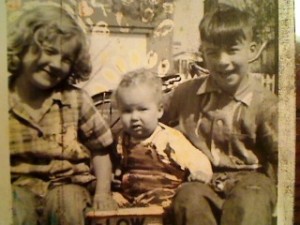Lay a Foundation of Unconditional Love
“Give my child unconditional love? Sure I do that. After all, I’m their parent!”
You will find this little piece of information from Gary Chapman very useful.
“Children are primarily emotional beings and their first understandings of the world are emotional. Studies show that the mother’s emotional state even affects the baby in the womb”.
The baby even responds to mom’s anger or happiness. Have you ever heard a child ask “What are you so happy about, Mom?” You might not even realize you’re acting ‘happy’, but your child picks up on it. They know when you’re angry or fearful also picking up on those feelings.
Parents really believe they’re showing their children love by supplying them with food, clean clothes, a home. Some even assume that their children know they love them. There are parents who believe saying, “I love you” is enough. According to Gary Chapman, “Few parents know how to transfer their heartfelt love to the hearts of their children.”
Saying I Love You is Good
Giving them food, clothing and a home is good, but all these are not sufficient to make a child feel unconditionally loved.
Children Respond to Actions
This is about what you do with them…loving them on their terms. An example: You can have a terrible day at work, come home and put off an aura of ‘frustration with life’. By ‘acting’ lovingly toward your child, reading them a book, talking about their day, you are showing them your love. It’s giving your child love even when you don’t feel like it. Your child will sense you’re in a bad mood, yet they see you still take the time to be loving with them….by showing them.
I John 3:18 NIV captures this beautifully “Dear children, let us not love with words or tongue but with actions and in truth.”
The love languages are those expressions that we give our children and other adults.
- Physical Touch
- Quality Time
- Gifts
- Acts of Service
- Words of Affirmation
If you’re reading this and wondering about your child(ren) age 5 and under, it would be tough to figure out their primary love language. Don’t let that stop or delay you from using all 5 love languages with them. Your child will be needing all 5 of these to grow and feel like their love tank is being filled. After their tank is filled then you can teach them how to use them in their own life with other people.
Most Adults Use Only 2 Love Languages in Their Life
Gary Chapman gives an interesting perspective here, “One mark of a mature adult is the ability to give and receive appreciation through all the love languages. Few adults are able to do this: most of them give or receive love in one or two ways.”
This thought alone makes you want to know more about the 5 love languages for yourself! How often do we enter a marriage and then having children only to find out we are not whole people. Our own love tanks run dangerously low or even empty. What would you like to pass on to your children and then even the next generation as you become a grandparent. Look into it now so you’re not looking back in regret!
Do you understand your own love language? What is your spouses? Leave your comments for the community here; we want to grow from your thoughts too!








Wow. How timely for me! My mother and her friend who are in their seventies only yesterday expressed sadness about the lack of love shown to them when they were children. They had noticed that I often kiss and hug my three year old just for no reason and both said they don’t remember their parents doing that at all. In turn, they didn’t do it to their kids (including me) and to this day they are uncomfortable about it.
Claire recently posted..Am I an Over Protective Mother
Claire,
The older we get, the more we have to regret. It’s awesome that you’ve taken the time to reverse that with your three year old.
Even though we may feel uncomfortable doing the opposite of how we were raised, we can still change. I’ve found that the feelings change over time and we become used to using the 5 love languages more freely. You’ll be glad when you look back with no regrets!
I love the 5 love language books! 🙂
I’m a words of affirmation (primary) and quality time (secondary). I’m fairly certain that the hubby is (acts of service & receiving gifts) we are so opposite on so many levels. ha!
I’m due to re-read the book addressing children as my eldest is 5 years old. If I had to choose, I’d venture to say his primary language is quality time.
heidi @ wonder woman wannabe recently posted..Whats Your Mom alary
It should be fun trying to decide on your 5 year old’s language. Five is a wonderful age!
Has you husband ever decided what he thinks he is? And does he agree with you on what you’ve come up with for yourself?
Over the next couple months, I’ll be posting more on parenting and I can’t wait to link back to the posts you have done on the love languages of our children! How easy it is for us to get caught up in the day to day of parenting and forget the individual needs (beyond the basics of food and water and sleep) of our children. Thank you for this awesome series!
Audra recently posted..Love and Television
Good to know that the postings are useful. It’s amazing that Gary Chapman wrote the books 15 years ago and have sold over 5 million. It’s truly timeless!
Thanks in advance for linking back, Audra!